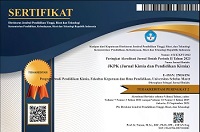Analysis of High School Students’ Argumentation Ability in the topic of Buffer Solution
Abstract
Argumentation is scientific discourse in science learning that is used as a link between knowledge from an environment and concepts in science learning. Through argumentation skills can be controlled student understanding in connecting facts with concepts in learning. This study aims to analyze students' argumentation ability on buffer solution subject. Students' argumentation ability is divided into 4 levels; level 1 (claims), level 2 (claims with data), level 3 (claims with data and one rebuttal), and level 4 (claims with more than one rebuttal). Data analysis was done by a qualitative descriptive method using a case study method. The case study method was chosen so that a study of 92 students who were research participants could be carried out in depth and comprehensive. The results obtained that the students' argumentation ability was at level 1 and level 2 argumentation. This shows that students' argumentation skills are still at low and medium levels. The results of this study can be used as a basis for improving the quality of teaching and further research.
Keywords
Full Text:
PDFReferences
H. Mercier and D. Sperber, ”Why Do Humans Reason ? Arguments For An Argumentative Theory,” Behavioral and Brain Sciences, vol. 34, pp. 57–111, 2011.
H. E. Mulyasa, Pengembangan dan Implementasi Kurikulum 2013. Bandung: PT Remaja Rosdakarya, 2014.
Direktorat Pembinaan Sekolah Menengah Atas, D. J. P. D. D. M. K. P. D. K., Panduan Implementasi Kecakapan Abad 21 Kurikulum 2013 Di Sekolah Menengah Atas. Indonesia, 2017.
S. E. Toulmin, The Uses of Argument (Updated Edition 2003), Cambridge: Cambridge University Press, 2003.
K. L. Mcneill, “Elementary Students’ Views of Explanation, Argumentation, and Evidence, and Their Abilities to Construct Arguments Over The School Year,” J. Res. Sci. Teach, vol. 48, no. 7, pp. 793–823, 2011.
A. H. Johnstone, “Multiple Representations In Chemical Education,” International Journal of Science Education, vol. 31, no. 16, pp. 2271–2273, 2009.
M. Orgill and A. Sutherland, “Undergraduate Chemistry Students’ Perceptions of and Misconceptions About Buffers and Buffer Problems,” Chemistry Education Research and Practice, vol. 9, no. 2, p. 131, 2008.
K. Puspendik, Hasil UN, 2017.
R. A. Marsita, S. Priatmoko, and E. Kusuma, “Analisis Kesulitan Belajar Kimia Siswa SMA dalam Memahami Materi Larutan Penyangga dengan Menggunakan Two-Tier Multiple Choice Diagnostic Instrument,” Jurnal Inovasi Pendidikan Kimia, vol. 4, no. 1, pp. 512–520, 2010.
J. Osborne, “The Role of Argument In Science Education,” Research and The Quality of Science Education, pp. 367–380, 2005.
C. V. Aufschnaiter, “Argumentation and Cognitive Processes in Science Education,” Paper presented at the Annual Conference of the National Association for Research in Science Teaching, Vancouver, 2004.
W. Sanjaya, Penelitian Pendidikan (Jenis, Metode, dan Prosedur), (3rd Ed.). Jakarta: Prenadamedia Group, 2015.
C. V. Aufschnaiter et al., “Arguing To Learn and Learning to Argue: Case Studies of How Students’ Argumentation Relates to Their Scientific Knowledge,” Journal of Research In Science Teaching, vol. 45, no. 1, pp. 1–131, 2008.
Refbacks
- There are currently no refbacks.








